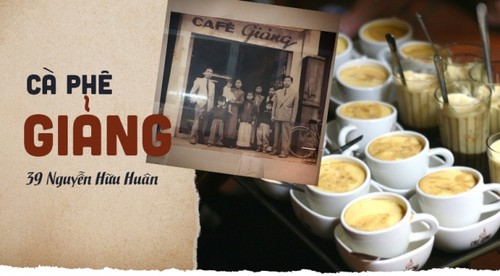 Giang cafe is famous for its egg coffee Giang cafe is famous for its egg coffee |
B: In his email to VOV on November 4, Mr. Lemke sent a reception report for our broadcast on October 16 on the frequency of 11885 khz at 16:00-16:27 UTC and shared his interest in our Sunday show with stories about a Pho signature restaurant, a 75-year old egg coffee shop, beautiful ladies posing with colorful flowers, and young green rice.
A: He wrote: “This past Sunday Show Oct 16, 2022 was the best show ever done. I enjoyed learning about what Hanoi has to offer and bring to the table. Other cities should be highlighted this way.”
B: Mr. Lemke told us that he has been listening to shortwave since 1982, for 40 years now, saying that he really enjoys listening to shortwave and still keeps his radio JRC NRD 535 HF he bought from a store in the US in 1995.
A: Thank you, Mr. Lemke for your comments and also for your update of the reception of VOV’s broadcast in Slovakia where you visited recently.
B: Next, we’d like to acknowledge emails from Shivendu Paul of the Metali Listeners Club of India, who shared his interest in our weekly Letter Box.
A: He wrote: “On October 23,28,29,31 and November 2, 7, I listened to the VOV English program and received moderate reception at UTC 1600-1630 on the frequency of 7220 KHz on my Grundig YB 80 receiver from Murshidabad, West Bengal India. Thank you for answering my question.”
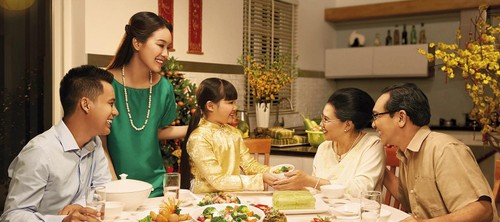 A family meal in Vietnam (Photo: internet) A family meal in Vietnam (Photo: internet) |
B: He added, “In our country, in India when we visit our friends, relatives, or neighbors’ house, we welcome them first, and then serve or offer tea/coffee and biscuits, sweets, snacks, water, and juice. And I want to know about some etiquettes in Vietnam. I love Voice of Vietnam Radio station.”
A: Thanks for your question! Vietnamese people generally greet each other by bowing slightly to each other or shaking hands. Hugging is reserved for relatives only. Vietnamese women generally do not shake hands with each other but the custom is acceptable between a Vietnamese woman and man. Vietnamese also often refrain from shaking hands with a senior or someone of higher rank.
B: Greet the elderly first, and bow your head slightly. 'Xin chào' (pronounced seen chow) is your safest bet if you want to say hello.
A: Next, let’s check out the Vietnamese dining etiquette. Food and mealtimes - particularly dinner - play a key role in Vietnamese culture. We mainly eat rice but you shouldn't fill your rice bowl to the brim as this is typically reserved for offerings at pagodas. Just go ⅔ of the way, and head for a refill later. Besides, you’ll need to save your appetite for all the delicious dishes!
B: You'll likely be served the best dishes first - and accepting and finishing these is considered respectful. The same goes for any tea or alcohol offerings. Many dishes include strong ingredients like fish sauce and or mam tom (shrimp paste). If you cannot stomach these, Vietnamese people will understand, but do make it clear to the host. Before you dig in, you should say “mời”, a common Vietnamese expression with a similar meaning 'Bon Appetit'.
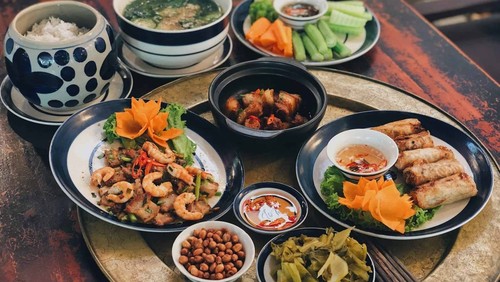 Typical dishes in a Vietnamese meal (photo: internet) Typical dishes in a Vietnamese meal (photo: internet) |
A: Your chopsticks are tools for eating, but you may unknowingly be using them wrong. Make sure you don’t rest your chopsticks in the food or vertically, which is considered a bad omen because of its similarities to incense when remembering the deceased. Other tips to remember include: putting food into your bowl before eating it; no exchanging of food between chopsticks; no pointing with chopsticks; and don’t knock your chopsticks loudly on your bowl - it is said to attract hungry ghosts.
B: Before eating, you should wait for the eldest to be seated first. Pass and receive any items - food or gifts - with two hands. This is a sign of respect for the giver.
A: Well, that’s brief sharing about some of Vietnamese etiquette. We’ll shed light one some more Vietnamese customs in other programs.
B: This week, we received more than 350 letters and emails from listeners of 35 countries and territories around the world. Many of them asked about Vietnamese straw liquor or tube liquor, which is called Rượu cần in Vietnamese.
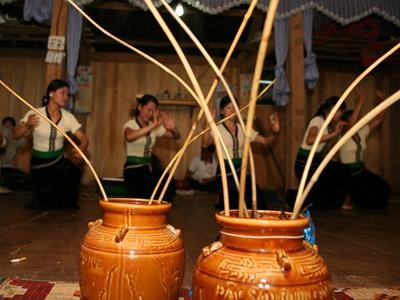 Rượu cần is typically for special celebrations or ceremonies in highlands regions of Vietnam Rượu cần is typically for special celebrations or ceremonies in highlands regions of Vietnam |
A: Rượu cần is typically for special celebrations or ceremonies such as weddings, festivals, or harvest feasts in some regions in Vietnam, particularly in highlands regions. It is often served in community events in the communal house. People usually dance and play music after drinking.
B: It is a fermented rice liquor made of cooked glutinous rice mixed with herbs from the local forests. The types and amounts of herbs added differ according to ethnic groups and regions. This mixture is then put into a large earthenware jug, and allowed to ferment for at least one month to reach the volume of 15 to 25% alcohol.
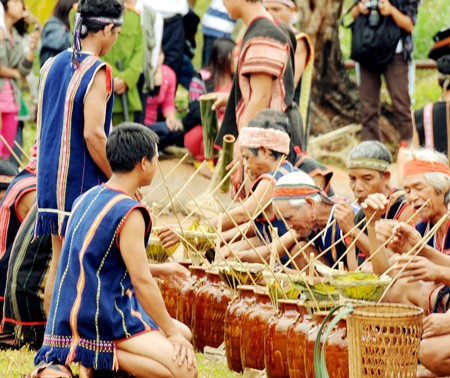 If you are invited to drink rượu cần by the locals, it means that you are seen as a distinguished guest. If you are invited to drink rượu cần by the locals, it means that you are seen as a distinguished guest. |
A: Its taste is totally different from rice alcohol or any kind of liquor. It is reserved for special celebrations or ceremonies such as weddings, festivals, or harvest feasts. If you are invited to drink rượu cần by the locals, it means that you are seen as a distinguished guest.
B: It is generally consumed by placing long, slender cane tubes in the jar, through which the liquor is drunk. Often two or more people (and sometimes up to ten or more) will drink together from the same jug communally, each using a separate tube.
A: Next, we’d like to acknowledge an email from Abdul Mannan of Bangladesh. In his latest reception report on VOV’s broadcast from 16:00 to 16:30 on November 7 on the frequency of 7220 khz, he wrote: “I’m a regular listener of the Voice of Vietnam’s English Service. I listen to your English program every day. I’m very sorry that I cannot hear your program clearly. Poor reception condition yesterday. I would be happy if I got your letter. I’m very happy that you read out my letter in the Letter Box.”
B: Thank you, Mr. Mannan, for your detailed report. We’ll forward it to our technicians and ask them to check the transmission. We look forward to receiving more regular feedback from you.
A: In his correspondence to VOV this week, Sanil Deep of India wrote: “ Here is a letter from your old friend in India. I have been a listener of VOV since the 1980s. This is my regular monthly report on your station, which I hope will be very useful to your technical dept. The frequency of 9840 khz is feeble at 10.00 hours UTC while your broadcast on the frequency of 12020 khz at 13.30 and 7220 khz at 16.00 hours is coming in well in my area.”
B: He added, “ VOV programs are No1 in my daily radio listening and I couldn't think of a day without listening to your programs. Your various programs give an opportunity to learn more about your country, its people, culture, and music. The friendly approach of your station will make more new listeners from all around the world tune in and listen to your programs. I’m still enjoying the Sunday program and never miss the Letter Box program, which is the listeners’ friendship program.”
A: Thank you, Mr. Deep, for listening to VOV for such a long time. We appreciate your feedback which is a source of great encouragement to us to continue our shortwave broadcast amid the boom of digital content.
B: We’re reading an email from Ashik Eqbal Tokon of Bangladesh who expressed his interest in our photo report on vovworld.vn: “I’m delighted to know how smartly Vietnam uses the fallen leaf. Not only for art but also for decorating foods and many more things. I was astonished to learn you have shopping bags made of a lotus leaf. Amazing. Thank you for the pictorial coverage of the ongoing leaf festival in the Mekong Delta. When fashion products are made from leaves, everyone must be surprised by what Vietnamese can do with these fallen leaves.”
A: Thank you all for tuning in to VOV and sending us your feedback. We welcome your feedback at: English Service, VOVWorld, the Voice of Vietnam, 45 Ba Trieu street, Hanoi, Vietnam. Or you can email us at: englishsection@vov.vn. You’re invited to visit us online at vovworld.vn, where you can hear both live and recorded programs.
B: Check out our VOV Media App, available on both the IOS and Android platforms, to hear our live broadcasts. We look forward to your feedback on the mobile version of vovworld.vn. Once again, thank you all for listening. Goodbye!